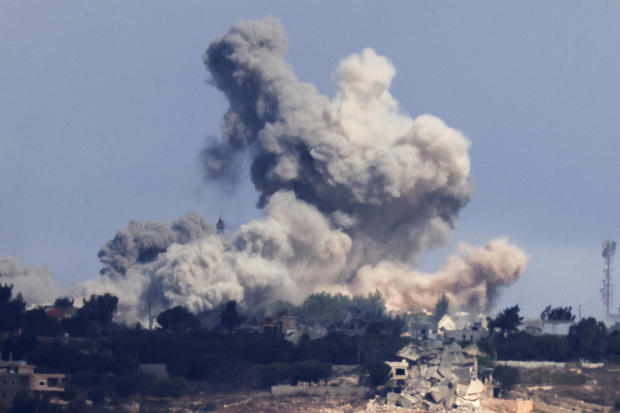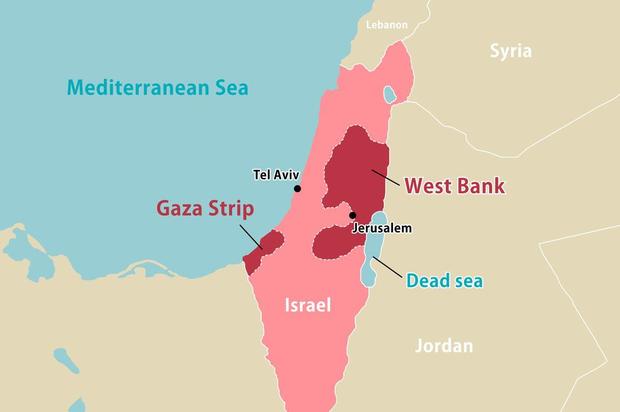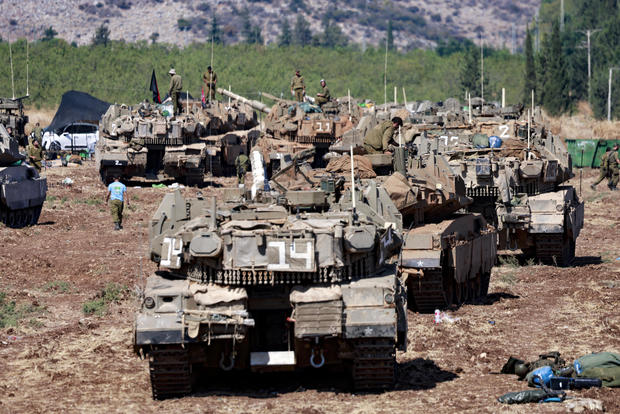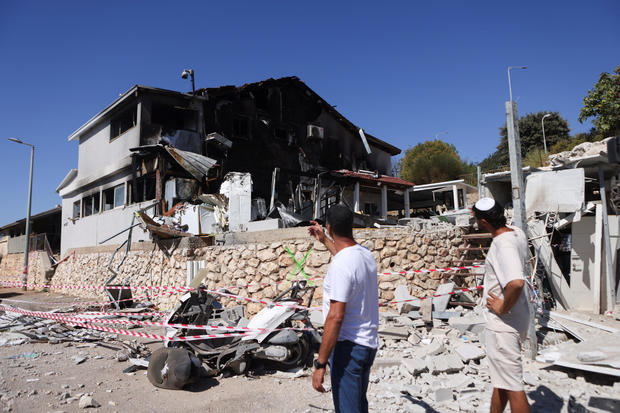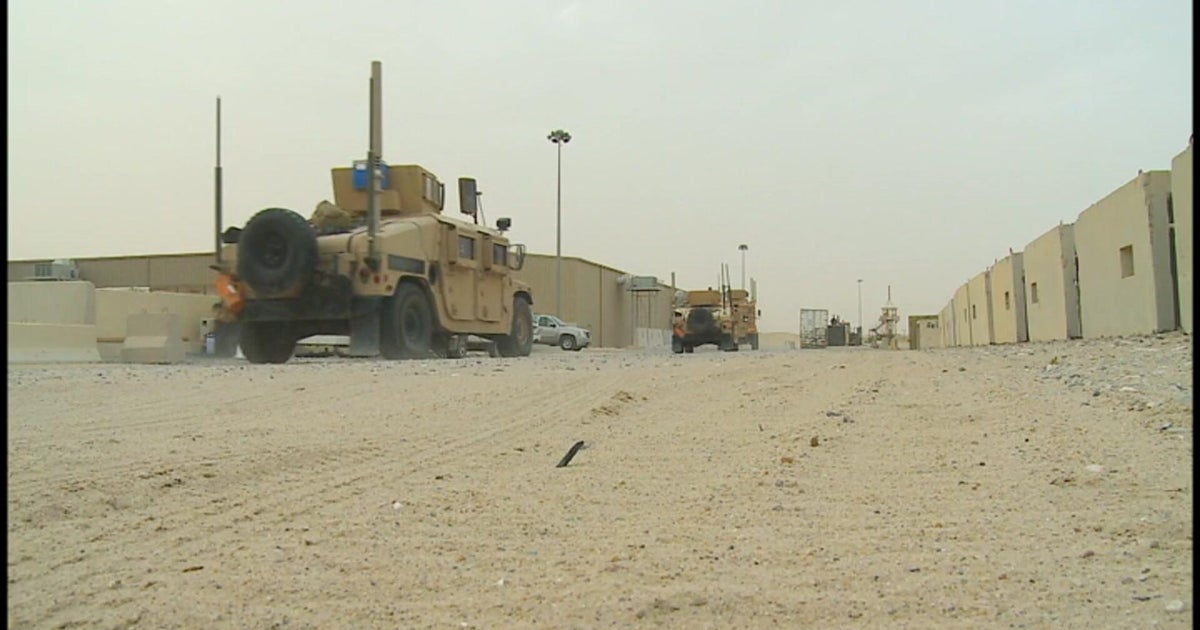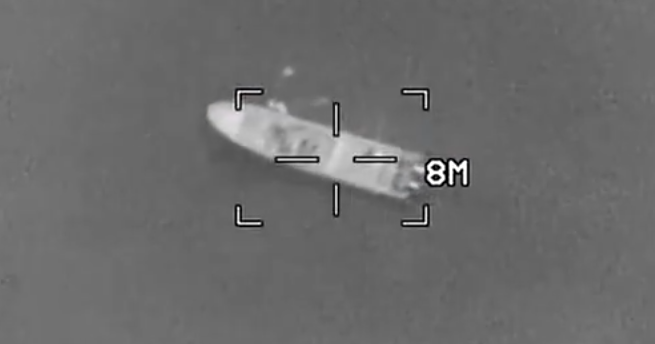Israel says 8 soldiers killed in Lebanon amid "intense fighting" on the ground with Hezbollah
Israel's military said Wednesday that eight soldiers had been killed in "intense fighting" with Hezbollah militants in southern Lebanon, three days after it launched ground operations in the country. The update on the ongoing ground raids came almost a year after Israel launched its war against Hamas in the Gaza Strip in retaliation for that Iran-backed group's Oct. 7 terrorist rampage, prompting Hamas' ally Hezbollah to start firing rockets at northern Israel.
The Israel Defense Forces announced the beginning of it said would be "limited, localized, and targeted ground raids" against Hezbollah in Lebanon on Monday, after about two weeks of blistering airstrikes on the group's strongholds in southern Lebanon and the southern suburbs of Lebanon's capital, Beirut. Those ongoing strikes have killed more than 1,000 people and displaced about 1 million from their homes, according to Lebanese officials.
The aerial assault — and unprecedented covert operations before it that saw thousands of pagers and walkie-talkies held by Hezbollah militants blown up with embedded explosives — largely decapitated the U.S.-designated terrorist organization. Its longtime leader Hassan Nasrallah was killed in a strike on Sept. 27, and at least half a dozen other senior figures, and dozens of mid-level operatives, have also been killed. But even as Israel prepared to launch its ground operation, Hezbollah's surviving deputy leader declared the group ready for war.
Below is a look at how the arch enemies came to be at war again for the first time since a roughly one-month conflict in 2006 that left more than 1,000 people dead in Lebanon and more than 150 in Israel — and what's at stake this time in the wake of Hezbollah's backer Iran launching its blistering Oct. 1 missile attack on Israel, fueling fear that the U.S. could be drawn into the fighting.
What's happening now along the Israel-Lebanon border?
The IDF confirmed Wednesday the deaths of eight soldiers in the cross-border raids, with initial statement confirming Captain Eitan Itzhak Oster, 22, "fell during combat in southern Lebanon." The IDF later named seven other soldiers killed in the combat.
The military said the soldiers were killed in two separate incidents, and that six troops, including an officer, were severely wounded in the same incidents. The IDF did not provide further information on the nature of the deadly incidents.
Earlier Wednesday, the IDF expanded its orders for people in southern Lebanon to leave their homes and evacuate north, away from the country's border with Israel, as its cross-border incursions to hunt down Hezbollah fighters and destroy their weapons and combat infrastructure appeared to intensify.
In a message posted on social media, IDF spokesman Lieutenant Colonel Avichay Adraee said there was "intense fighting going on" in southern Lebanon, accusing Hezbollah of "using the civilian environment and the citizens as a human shield to organize to carry out attacks."
Adraee issued a new evacuation order to residents in 24 towns and villages across southern Lebanon, adding to the 28 villages from which he warned residents to evacuate on Monday.
In its own statements on Tuesday, Hezbollah said its fighters were engaged in ongoing clashes with Israeli forces in the town of Maroun al-Ras, claiming to have inflicted "several casualties among them." It also claimed to have inflicted Israeli military casualties in a clash in the town of Adissah. Both towns are within about a mile of the so-called Blue Line that separates northern Israel and southern Lebanon.
The IDF has provided little information about its ground operations against Hezbollah since announcing they were underway, but it has continued bolstering its forces along the northern border, announcing Wednesday that another three brigades were being sent up to join "the limited, localized, targeted raids on Hezbollah terror targets and terrorist infrastructure in southern Lebanon."
Hezbollah has stepped up its months-long rocket attacks on northern Israel since Israel's cross-border raids began. Israeli air raid sirens blared in a number of towns near the border, and the IDF reported about 100 rockets being fired from Lebanon at northern Israel on Wednesday. There were no immediate reports of injuries.
Israeli Air Force jets were also still launching strikes on southern Lebanon and the southern suburbs of Beirut. The air force said in a statement that it was targeting "munitions production sites and other terrorist infrastructures in the area."
The Lebanese Ministry of Health said Wednesday that about 55 people were killed in Israeli strikes over the past 24 hours alone. The Lebanese Disaster Management Unit said Israel's ongoing strikes in the country, which began almost a year ago, had killed more than 1,870 people and wounded more than 9,000 others.
While the extent of the ongoing Israeli ground operations remained unclear, at an IDF staging area just south of the Lebanese border, it was apparent earlier in the week that Israeli forces were preparing, at least, for a significant assault.
Dozens of tanks, armored fighting vehicles and bulldozers were lined up, ready for orders. On the other side of the border, tens of thousands of Hezbollah fighters — with a vast tunnel network, a reputation for guerrilla warfare and suicide bombings — were dug in, waiting to defend the territory they've controlled for decades.
The last war, in 2006, ended with a cease-fire, and a United Nations peacekeeping mission of around 10,000 troops has been deployed near the border in Lebanon, along the Blue Line, ever since. That mission, the United Nations Interim Force in Lebanon, called Israel's plans to launch ground operations in the country a "dangerous development," noting that its "peacekeepers remain in position."
"Peacekeeper safety and security is paramount, and all actors are reminded of their obligation to respect it. Any crossing into Lebanon is in violation of Lebanese sovereignty and territorial integrity," UNIFIL said in a statement. "We urge all actors to step back from such escalatory acts, which will only lead to more violence and more bloodshed."
Why is Israel attacking Hezbollah in Lebanon?
Israeli officials have said the goal of the operations against Hezbollah is to enable roughly 60,000 people forced to flee their homes in the northern part of the country to return. They were driven away — under evacuation orders in many cases — by the hail of rocket, drone and missile fire launched by Hezbollah militants from Lebanon.
That onslaught, albeit largely ineffective thanks to Israel's advanced missile defense systems, began the day after Israel started bombing Hamas targets in Gaza in the wake of the Oct. 7 terrorist attack. That massacre saw Hamas and allied terrorists kill some 1,200 people in southern Israel, and take 251 others as hostages back into Gaza, according to Israeli officials.
Since then, Israel says Hezbollah has fired more than 8,000 weapons across Lebanon's southern border. The vast majority of the projectiles are intercepted, but some do crash down, and a handful of people have been wounded in northern and central Israel by the attacks, including two men hurt by rockets that hit a bus and another vehicle on Oct. 1. The most lethal attack was a rocket that slammed into a soccer field in the Israeli-controlled Golan Heights in July, killing 12 young people. Hezbollah denied firing the rocket, but Israel and the U.S. blamed the group.
Israeli Prime Minister Benjamin Netanyahu has vowed to force Hezbollah back from the Lebanon border far enough to stop the barrage of rocket fire, so the displaced residents of northern towns and villages can return to their homes.
"The reality is that, prior to October 7th, there was always a vulnerability [from Hezbollah], but Israel always thought it had been tamed," Sanam Vakil, director of the Middle East and North Africa Program at the global affairs think tank Chatham House, told CBS News in September. "What October 7th has done, I think for Israel and Israelis, is reawaken them from, you know, that mirage that they were safe and secure. So going back to October 6th without altering the balance of power on Israel's borders and within Israel seems hard to do."
"We all feel suffocated by the situation. We don't breathe," Sarit Zehavi, a researcher who worked for 15 years in Israeli military intelligence and lives in northern Israel, told CBS News before the ground operations began. "On October 8th, basically, the war started here, with Hezbollah."
Speaking with CBS News again on Oct. 1, Zehavi said she hoped the overall Israeli military operation against Hezbollah "will succeed — that we will succeed in eliminating all the [Hezbollah] ground infrastructure in the area next to the border." But she recognized that a military assault alone was unlikely to ensure peace for northern Israel in the longer term.
"To tell the truth, I hope it will end with some kind of diplomatic arrangement that will enable us to breathe many more years, because they [Hezbollah] will strive to recover… After what happened on October 7th, you can no longer see Hezbollah on the other side of the border. This is the threat we cannot live with anymore."
The U.S., Iran, and the risks of a wider war
For weeks, President Biden has called for a cease-fire as Israel and Hezbollah exchanged increasing fire over the southern Lebanon border. U.S. officials at the White House, State Department and Pentagon have all made clear the risks of an all-out war between the close American ally and Iran's most powerful proxy force in the heart of the Middle East could spiral into a broad regional conflict.
Those concerns were heightened Tuesday by Iran's launch of some 180 ballistic missiles at Israel, and Prime Minister Netanyahu's vow to retaliate at the time and place of Israel's choosing.
Iran backs a number of groups across the region, including Hezbollah, Hamas and the Houthi rebels in Yemen. Tehran refers to these groups as a "resistance front" against Israel's decades-long occupation of Palestinian territory, while Israel refers to it as an axis of evil with the ideological goal of wiping the country off the map.
Hezbollah calls its rocket and drone attacks on Israel a legitimate support and defense of Palestinians in Gaza and the Israeli-occupied West Bank, and the Houthis have claimed the same rational for their months-long targeting of commercial and military vessels in the Red Sea.
One of the biggest risks, from a U.S. security perspective, is that Iran's proxy groups — including smaller militias based in Iraq and Syria — will target American forces in the region in retaliation for Washington's support of Israel. They've done so already since Oct. 7, firing rockets and drones at U.S. bases and other installations more than 165 times. Most of the attacks are inconsequential, but in January, drones fired by an Iran-backed group in Iraq hit a U.S. outpost in Jordan, killing three U.S. troops and wounding dozens.
Despite the risks and Washington's calls for deescalation, however, Israel has appeared determined to seize the momentum, with Hezbollah on a back foot in the wake of the aerial bombardment. The message has been clear: The best way to deescalate the war, from Israel's perspective, is to win it.


